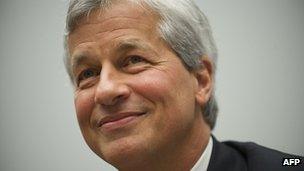JP Morgan pays $410m to settle US energy case
- Published

JP Morgan chief executive Jamie Dimon has been trying to improve the image of the bank
JP MorganChase's energy unit has agreed to pay $410m (£268m) to settle charges from the top US energy regulator that it manipulated energy markets.
The Federal Energy Regulatory Commission (FERC) agency alleged JPMorgan's trading practices drove up prices for electricity, mainly in California and the Midwest.
The fine is the second largest penalty in FERC history.
The bank did not admit any wrongdoing as part of the settlement.
JP Morgan said it was "pleased to have reached an agreement with FERC to put this matter behind it".
JP Morgan spokesman Brian Marchiony said the settlement would "not have a material impact on our earnings", because the bank had previously set aside reserves for the case.
FERC claimed JP Morgan's energy unit used five "manipulative bidding strategies" in California between September 2010 and June 2011, and three in the Midwest from October 2010 to May 2011.
The regulator alleged that traders at JP Morgan's energy unit created artificial conditions to boost the price of energy.
Under the deal, the bank must also make annual reports to the commission for three years detailing its power business in the United States.
JP Morgan has already sold the rights to buy the gas and sell the power from its California plants.
The energy rigging case is the latest embarrassment to hit JP Morgan. Last year, the bank suffered a $6.2bn (£4bn) loss after trades made by the so-called London Whale turned out to be bad.
Last year FERC fined Barclays $453m (£300m) for allegedly manipulating electricity prices. Barclays protested about FERC's findings, but US regulators upheld the fine earlier this month.
- Published19 July 2013
- Published21 May 2013
- Published12 April 2013
- Published17 July 2013